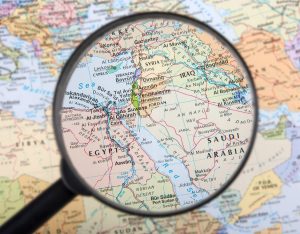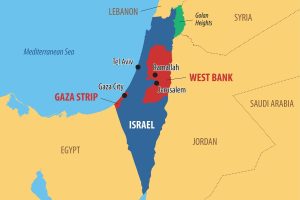I must confess that I have often avoided writing on the subject of War and Peace in the Middle East. The subject is not easy , is rather close to home and it may be difficult to cover all the aspects in a comprehensive manner.
That being said , recent events have brought home the realisation to me that this is a subject that I must address. I will mention in particular, the kibbutz Nir Oz. I am very familiar with the kibbutz. I have regularly visited the factory Nirlat which is adjacent to Nir Oz during the last twenty five years. I last was in the kibbutz about two months age. All the time I have known the kibbutz it has been a peaceful and productive place. The recent barbaric attack on the kibbutz and other Israeli towns and villages in the area is for me and for many others shocking and demands a response.
As an intellectual of sorts, my personal response will of necessity be of an intellectual type. I ask myself what are the causes of these sorts of events and how they can be prevented in the future. Obviously the immediate cause is the Hamas organisation, in particular its leadership.
That being said the Hamas organisation has backers and financiers. Its has ideas which resonate unfortunately with some. Any attempt to construct a lasting peace means dealing with all of these.
The Hamas organisation is just one grouping in the Middle East. Any attempt to constitute a genuine and lasting peace in the Middle East has to consider the causes of present and likely future conflicts. We have to consider how, on the one hand real problems can be addressed, and how on the other hand those intent on conflict for whatever reason can be dealt with.
My life experiences have given me a wide viewpoint on the subject. I can bring a unique perspective which I hope may find an receptive audience.
I will start with a number of quotes from Jewish sources on the importance of Peace.
“Rabbi Eliezer says – How important is peace – All of our prophets talked about nothing except Peace “. ” Rabbi Shimon says – How important is peace – There is no utensil capable of preserving prosperity except Peace” . “Rabbi Elazar says – How important is peace – Even the dead are in need of Peace. How important is peace that even at times of war we need to call for and make efforts towards Peace“.
What is peace ? How is it to be defined ? At its simplest and most minimalistic level Peace is the absence of War. This sort of Peace is also sometimes referred to as a Cold Peace. A more comprehensive and unqualified definition of Peace would include and be defined by the positive – “Harmony in relations, Cooperation, Mutual Respect”.
Of course there may be many intermediate levels between the minimalistic and the comprehensive.
Time also plays a central role. If one takes any two entities , the relations between them may grow closer with time or more distant.
Any discussion on this subject must review the reasons for war and then how these can be neutralised. Then we must go beyond the reasons for war and talk about the motivations for peace, beyond the absence of War.

The most common motivation for War is conflict over resources. This sort of War can be frequently seen in natural world as well. For example see Wolves War This motivation for War is reflected in the Hebrew word for War “Milchama” which is based on the same root as the word for bread “Lechem”.
There are also other causes for War such as ideology or religion.
Of course motivations may be tangled and subject to interpretation or misinterpretation.
Given that conflicts over resources are commonplace the world over , an interesting question is why there are so few wars nowadays. The obvious answer starts with the fact that a larger army will most often defeat a smaller or more poorly equipped army. Hence human societies have experienced strong pressure to evolve into larger and larger conglomerates where internal conflicts are handled and resolved by the means of judiciary, police, legislature etc.
This progression of human societies to larger and larger conglomerations has not necessarily been a linear one. Empires and alliances have fragmented into smaller units over history. This is probably because peoples identification is stronger and more natural with the local and immediate. However the overall direction of history is quite clear.
The division of the world into several large conglomerates has not itself led to any sort of permanent peace. Indeed when wars have been fought between conglomerates , they have been extremely destructive. Such wars have also been known as World Wars.
All of this has been highly influenced by technology. The invention of nuclear weapons has raised the potential destructiveness of any nuclear war to levels unimaginable in the past. On the one hand this may have served as a deterrent to the breakout of some wars. It is however perfectly clear that this deterrent is not something that can be relied on.
The current global degradation of the environment due to the excess emissions of greenhouse gasses and other human activities is another complicating factor. Degradation of the environment means less production of food amongst other deleterious effects. Less potential food availability is likely to increase the likelihood of wars as a means of securing resources. This is likely one of the motivating factors for the Russian invasion of Ukraine and the resulting ongoing War.
All of this is true globally.
In the Middle East all of these factors and others are in play. Known conflicts or motivations for conflicts include the following:
- Economic Motivations:
- Environmental degradation leading to reductions in agricultural resources.
- Limited agricultural resources with respect to population. The population in all of the countries in the Middle East is dependant on imports from outside . This problem is also projected to intensify as population rises and agricultural resources decline due to Environmental degradation and mismanagement etc.
- The region is divided into relatively rich countries with high incomes from hydrocarbons, and poor countries with relatively large populations and very low incomes per capita. Economic disparities provide ample motivation for conflict.
- Conflicts over oil, gas etc.
- Ideological or religious motivations:
- Shia vs Sunni. Iran vs Saudi Arabia etc.
- Resistance to Israel for ideological reasons.
- Nationalism or political reasons:
- Autocratic regimes with little interest in the well being of the population at large.These regimes may have an interest in stoking conflict elsewhere as a means for distracting populations from economic inequalities.
- The Unresolved status of territories in the West Bank, Gaza etc.
- Proxy wars initiated or supported by powers from inside or outside the Middle East.
- Military motivations.
- Nuclear technology.
- Power imbalances. The prospect of easy conquest may in itself motivate War. A good example of this is the Iraqi decision to invade Kuwait in 1990. This factor has also been at play in a number of wars involving Israel. The territory of Israel is extremely small vis a vis neighbours.
Of course some of these motivations may and do overlap.
Having talked about motivations for conflict in the Middle East, I will now talk about the ways to defuse or remove these motivations.
- Economic Motivations- Solutions:
Given the environmental degradation in the Middle East, the rising populations and the falling agricultural resources of most all countries in the Middle East the only way to avoid or reduce further loss of life via war or hunger is to place far more emphasis on environmental protection and rejuvenation than is currently the case. There is an urgent need to adopt and implement a regional plan to reduce rapidly greenhouse gas emissions. Such a plan would include:
- Substantial reductions in the productions of hydrocarbons – oil and gas.
- Substantial investments in environmentally friendly technologies, agriculture etc.
- Some transfer of resources from the rich countries to the poorer ones to enable them to rebuild their economies on viable foundations.
- Some regional body to oversee all of the above.
It should be noted that reductions in the productions of hydrocarbons will raise in the short term their price, which could provide more resources for financing the plan.
Implementing such a plan would in all probability substantially improve the situation vis a vis democracy and human rights across the Middle East. Countries whose economies are heavily dependant on mineral reserves of one sort or another tend to develop in into autocracies or dictatorships. See also Rentier State. There is a connection between a diversified economy and democracy.
Failure to implement such an environmental protection and rejuvenation plan will to the best of our understanding lead to further tragedies in the Middle East and elsewhere. Nature has inbuilt mechanisms for restoring balance in ecological systems. Lack of food will inevitably lead to further loss of life via war or starvation or disease or some combination. Currently all of the countries in the Middle East are dependant on food imports from other regions of the World . Reductions in global food production whether due to environmental degradation or War will inevitably reduce the supply of food reaching the Middle East. In that case the current famine in Sudan could spread widely across the Middle East.
- Ideological or religious solutions:

Over the ages a lot of religious thought which originated in the Middle East has spread widely. Even today, the issue of religion is important in the Middle East. Any discussion of War and Peace must take into account the issues pertaining to religion.
What is religion or how is this concept to be defined ? Actually a great many definitions have been given. One definition in which I see a lot of merit is that originally expressed by Emile Durkheim; “A religion is a unified system of beliefs and practices relative to sacred things, beliefs and practices which unite into one single moral community“.
One can break this down into a number of elements:
- Beliefs
- Practices
- Things worthy of reverence and respect.
- Morals.
- Community.
The last item on the list helps to explain why religions have endured in some form or other for so long. A group of people who share common beliefs and practices will, if the beliefs , practices and morals are reasonably sound, form a community. Such a community will be over the long run be more successful than an amorphous group of people with not much in common, or other groups whose beliefs , practices and morals are less sound.
This sort of definition is also useful as it allows us to recognise that other belief systems of later prevalence have a lot in common with the classical religions. Communism for example had a belief system based on dialectical materialism. It had a vision of future paradise at least for the workers. Democracy is also based on a set of beliefs and practices including the idea that the public should have a say in their governments, that governments may be replaced by democratic means etc. The difficulties that have been seen when attempts have been made to establish democracies across the Middle East may be due to a lack of the underlying beliefs necessary for establishing and maintaining democracies.
Part of the problems we have today stem from the fact that the classical religions have been greatly weakened. In the place we have a sort of anarchy of ideas and beliefs including nationalism, socialism, environmentalism and lots of other isms. The net effect is that humanity does not have common ethics and some problems are not dealt with effectively.
That being so , in essence creating peace in the Middle East or anywhere else , starts with creating or reaching a consensus on a core set of sound beliefs , practices and morals which the great majority will ascribe to and practice. These core principles would then also find expression in the laws and constitutions of the various countries.
Laws and enforcement are always going to be necessary to deal with any minority that does not abide by the rules.
Given what we know today about the precarious state of the Environment the core practices must include protection for the Environment.
- Political solutions Constitutuional Democracy:
As Immanuel Kant observed autocratic regimes are more likely to initiate wars as they do not feel pressure from the population to refrain from wars. Hence lessening autocracy is a likely route to increasing the chances for peace.
Israel is the most democratic country in the Middle East , as determined by Wikipedia .
Hence inasmuch as Israel prospers and enjoys peace, we will likely see more democracy in the Middle East and more peace. The converse is likely also true.
So now I will come to some issues which are highly relevant here.
Status of territories occupied in 1967 – Judea, Samaria, Gaza
These territories have been essentially left in limbo. The countries of which they were originally part, Jordan and Egypt have relinquished any claim on them. They have not been integrated within Israel proper. Neither have they been recognised as independent. The unsettled state of these territories is undoubtedly a cause of friction.
Now i will consider some of the solutions that have been proposed.
Two State model. Often proposed as a solution which would bring peace and stability. However realistically the chance of a stable and long term peace with this model seem remote. This model does not make a lot of sense geographically. Given the fact that each State would realistically control only a small area, instability is likely to result. The net effect would likely be another War down the road. Notable that when Israel only controlled borders as delineated pre 1967 long term peace was not on the table.
One State model. Covering the areas currently controlled by Israel including the West Bank and Gaza. This makes sense geographically. The problems include forging a common core identity amongst the various populations. Without such a common identity such a State would likely break up one way or another. Demographic considerations, which are another way of saying that a common core identity is lacking, make such a political model problematic. The case of Lebanon is also relevant. In the case of Lebanon , one State was set up encompassing diverse ethnic groups. The current state of Lebanon is far from encouraging.
So what is a viable path forward ?
It may be helpful to look at a map:

In the long run , having one political entity that will manage this land makes more sense than dividing the land up into scraps that are never likely to achieve peace and stability. The real question is how to do this , taking into account all that has gone before.
Rome was not built in a day and neither was Jerusalem. The European Union went through a number of stages including the founding of the Council of Europe in 1949, the setting up of the European Coal and Steel Community (ECSC) in 1950 and the European Economic Community (EEC) in 1957. Even today the European Union is a fairly loose union where countries are free to leave if they should so wish.
We undoubtedly could do with a political entity to manage the whole of the country. The form that political entity will take will have to be developed slowly and carefully.
No doubt one could start with meetings of intellectuals. One could proceed from there to a variety of groups. Another possible step forward would be setting up a weak political entity and so on. The political structure is important and should be based on ethics and values in the first and foremost place. Common Ethics and values are the only foundation on which such a political structure can be stable. Peace , Prosperity , Harmony and the Environment should be at the base of any such political structure.
All of this is relevant to the current situation in Gaza. If it becomes accepted that a political solution will require some common political structures and in the long run we are going to have unified military control in the country then it is obvious that we are not going to want the operation of other military forces within the country.
- Nuclear Solutions:

Nuclear Weapons are a global problem which pose a threat to all of humanity. In the Middle East specifically there are some things which should be done.
- Everyone , including Israel should sign on to the Non proliferation treaty.
- Given that the Non proliferation treaty is probably not effective enough , we should pursue a better treaty.
The threat posed by nuclear , can in the long run only be controlled and mitigated by an alliance of countries around the World. The Middle East is however a good place to start given that no State officially has nuclear weapons .

I think your theories are very worthwhile and valid, but I’m not sure how you could convince the rich countries to subsidize the poorer nations. They would have to think that they are getting something out of it. Of course, if they thought there would be a huge influx of refugees, that could trigger a response.
Yes, there needs to be some sort of coming together between Israel and the Palestinians but how to implement it? Is there a solution and would America be able to come up with some NEW ideas? It all depends on who is the President and his/her powers of negotiation/persuasion.
At the present time, Israel seeks to eliminate Hamas, which may happen in the short term, but long term……..? Doubtful!
Perhaps you have to go into politics and I wish you great luck with your insightful ideas.
Thanks,
I do not see this as the rich countries subsidizing the poor ones. We have global problems which are affecting, or will affect all countries . The only way of dealing with these problems is via global efforts. Obviously money should be taken principally from those with the ability to pay. Take persuasion and firm basis obviously.
I have plenty of ideas as you say. Not sure that America does. In any case for ideas to be workable in the Middle East , they should most likely be developed or at least refined here ,
Thanks !
A fascinating article, Jeffrey – and a great analysis of the primary causes of wars.
I don’t see the oil and gas producing countries limiting or reducing their production – other than for political or economic reasons (especially in the Middle East and Russia) – and certainly not to save the environment.
As for peace between Israel and the Palestinians – well, you’re there, so you have a much better understanding of the situation than I might, but it seems to me that for negotiations to be successful, both sides have to agree on the other’s right to self-determination, as the starting point.
As Hamas is a genocidal terrorist group that has made extremely clear its intentions for all Jews, not just Israel, I don’t see any common ground there. There might be more of a chance with Fatah, but is there really much of a possibility now? How much support would there be nationally for a two-state solution? There also has to be a government that wants to take that step.
Thank you Richard,
A lot of different points here,
The environment is a political and economic issue par excalance. Maybe I will expand on that,
If both sides agree on the other’s right to self-determination, then we are essentaily promoting a two state solution. Given the geographical realities and other factors what are the chances that this would this lead to long term peace ? Not very high I think. Still I will expand on that.
As for who to negotiate with, I really think that Israel is the most important party. First of all should refresh our own policy and goals and then try to sell that to the other parties involved.
Peace, prosperity, harmony and the Environment…
How do any of these ideas fit in with the Hamas, Syria and most of the Middle East.
More like bloodshed, forced impoverishment, hate and…..what is the environment???
Thank you Sharon for your input,
Peace, prosperity, harmony and care for the Environment are a long long way from the current state of the Middle East. Still we have a choice. Do we just see the current state of affairs as inevitable and irreparable or can we see a path to a better future.
Personally I think a better future is possible. Not easy to build a better future but I think carrying on with the current state of affairs will likely not be easy at all.
All of our prophets talked about peace and harmony as future states of the World. So the questiob is how we get there ?
The environment is the Natural World including and especially its ability to support life now and in the future.
Personally I am in favour of some form of confederation, two states, the State of Israel and the Palestinian state, separated
by a border based on the Green Line, no physical barrier, free movement,
and a joint confederative government, with equal rights for all, Israelis and Palestinians.
I do not think our current situation is tenable, horrific wars every few years, massacres and abductions by Hamas, bombardment by Israel of Gaza, with thousands of people including children killed, and constant trauma and grief.
None of us can live this way.
Thank you Josie,
I agree that the current situation is not tenable at all, and depressing.
Still we have to be careful when proposing alternatives to ensure that they will lead to genuine improvements. We are all familiar with the expression – “out of the frying pan into the fire …” .
Whatever solution we propose, we will have to take into account that some elements are going to attempt to torpedo it. Hence we should build arrangements that are robust. I see this in a way as a matter of good design.
I will expand on some of these issues.
Thank you Jeffrey.
Two-state model or one-state? Both have pros and cons, and neither appears tenable – at least in the short-term.
Liberal democracies (in the west) all promote the two-state model, and this would appear (on the surface at least) to be the best model – allowing both Israel and the Palestinians to live side-by-side, and determine their own fate. However, after the horrific attacks of 07 October, would any Israeli government (of any political colour) want to have an independent Palestinian entity right next to it?
The Palestinian Authority (controlling only the West Bank) has little respect and support amongst its people, many of whom support the extremists (consider the support for Hamas in the West Bank, as well as in Gaza, after 07 October). After Israel pulled out of Gaza in 2005, it was only a little time before Hamas overthrew Fatah in Gaza, took control and killed all their political rivals. If an independent Palestine (consisting of the West Bank and Gaza) came under the control of extremists, how safe would Israel be? How long would it be before Israel felt the need to take pre-emptive action against the very real threats from east and west (never mind the north)?
As for the one-state model, a full occupation and assimilation of the West Bank and Gaza would not work, as, apart from the resistance amongst the Palestinians, it would mean that the Jews would soon be in a minority in their own land, and what would that mean for democracy, for the only democratic country in the Middle East?
A confederation (on the Swiss or German models) would not work, as the federal state would need its members to agree on democratic standards and equal recognition of both entities amongst its peoples. Free movement and open borders – on the European model – can only work under strong, liberal democracies.
So it looks like neither model is realistic in the short-to-medium term.
So what is the answer? Is there an answer? It is probably like the famous quote from the British Prime Minister, Lord Palmerston about the Schleswig-Holstein question (an area of Prussia contested by several European states throughout the 19th century):
“Only three people have ever really understood the Schleswig-Holstein business,” Lord Palmerston is reputed to have said. “The Prince Consort, who is dead; a German professor, who has gone mad; and I, who have forgotten all about it.”